5 citations,
March 2013 in “BMJ case reports” Gastric bypass surgery improved a woman's hormonal disorder without the need for medication.
5 citations,
September 2012 in “BMJ case reports” Ashwagandha may improve hormone levels and reduce hair loss in non-classical adrenal hyperplasia.
 5 citations,
January 2012 in “International journal of trichology”
5 citations,
January 2012 in “International journal of trichology” A 2-year-old boy had no hair and unusual organ placement, and it's unclear if it's genetic or coincidental.
4 citations,
December 2021 in “Dermatologic Therapy” Mesotherapy for hair loss can cause temporary forehead swelling.
 3 citations,
November 2022 in “Advances in Clinical and Experimental Medicine”
3 citations,
November 2022 in “Advances in Clinical and Experimental Medicine” Electric pulse treatments for breast cancer show promise in being safer and more effective, with fewer side effects.
 3 citations,
January 2020 in “Skin appendage disorders”
3 citations,
January 2020 in “Skin appendage disorders” In Spain, dermatologists most commonly prescribe topical minoxidil and oral finasteride for male hair loss, and topical minoxidil and oral contraceptives for female hair loss. The use of oral dutasteride and oral minoxidil has significantly increased over the past three years.
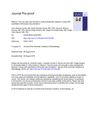 3 citations,
September 2019 in “Journal of The American Academy of Dermatology”
3 citations,
September 2019 in “Journal of The American Academy of Dermatology” Low-dose oral minoxidil effectively treats mild-moderate male hair loss, alone or combined with other therapies.
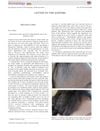 3 citations,
June 2018 in “Australasian journal of dermatology”
3 citations,
June 2018 in “Australasian journal of dermatology” Eight people with severe hair loss grew their hair back naturally.
2 citations,
September 2022 in “American Journal of Clinical Dermatology”  2 citations,
March 2022 in “PubMed”
2 citations,
March 2022 in “PubMed” Most skin reactions to COVID-19 vaccines in India were mild and not a reason to avoid vaccination.
 2 citations,
January 2022 in “Journal of Cosmetic Dermatology”
2 citations,
January 2022 in “Journal of Cosmetic Dermatology” QR678 Neo® is a safe and effective treatment for hair loss in men and women.

The authors suggest that 5-α-reductase inhibitors, like dutasteride, are effective in treating frontal fibrosing alopecia and should be the first-line treatment, with other options for severe cases. They also recommend further research on Janus kinase inhibitors.
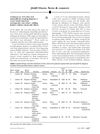 2 citations,
January 2021 in “Journal of The American Academy of Dermatology”
2 citations,
January 2021 in “Journal of The American Academy of Dermatology” Low-dose oral minoxidil for hair loss seems to have rare side effects, but more research is needed to confirm its safety.
2 citations,
January 2017 in “Case reports in endocrinology” Ashwagandha root improved symptoms of nonclassic 11-hydroxylase deficiency in an elderly woman.
 1 citations,
July 2024 in “Journal of the European Academy of Dermatology and Venereology”
1 citations,
July 2024 in “Journal of the European Academy of Dermatology and Venereology” Oral dutasteride is effective and safe for treating frontal fibrosing alopecia.
 1 citations,
July 2024 in “Journal of Cosmetic Dermatology”
1 citations,
July 2024 in “Journal of Cosmetic Dermatology” Low SULT activity in hair follicles leads to better response to oral minoxidil for hair loss.
 1 citations,
September 2023 in “Acta dermato-venereologica”
1 citations,
September 2023 in “Acta dermato-venereologica” Certain genetic variants are linked to frontal fibrosing alopecia in Spanish patients.
1 citations,
April 2023 in “Scientific Reports” Self-assembling RADA16-I hydrogels with bioactive peptides significantly improve wound healing.
1 citations,
December 2022 in “Pathogens” A stray cat with severe scabies recovered after 4 weeks of treatment.
1 citations,
July 2022 in “JEADV Clinical Practice” New and existing treatments for hair loss show promise, with some being more effective for men and others for women.
 1 citations,
August 2021 in “International journal of cosmetic science (Print)”
1 citations,
August 2021 in “International journal of cosmetic science (Print)” Using piroctone olamine on the scalp helps reduce hair loss and improves scalp health.
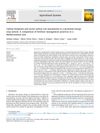 1 citations,
November 2020 in “Journal of The American Academy of Dermatology”
1 citations,
November 2020 in “Journal of The American Academy of Dermatology” Low input with cover crop optimizes yield and reduces greenhouse gas emissions.
 1 citations,
September 2020 in “Cochrane library (CD-ROM)”
1 citations,
September 2020 in “Cochrane library (CD-ROM)” The analysis aims to identify the most effective and safest treatments for alopecia areata.
 1 citations,
March 2019 in “Actas Dermo-Sifiliográficas”
1 citations,
March 2019 in “Actas Dermo-Sifiliográficas” New cancer treatments are less harmful to hair but can still cause hair loss, color, shape, and growth changes.
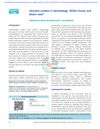 1 citations,
January 2014 in “Indian Journal of Dermatology, Venereology and Leprology”
1 citations,
January 2014 in “Indian Journal of Dermatology, Venereology and Leprology” The document concludes that clear communication and a strong doctor-patient relationship are essential for effective informed consent in dermatology.

Frontal fibrosing alopecia in men is often misdiagnosed and needs better diagnostic criteria and treatments.
February 2025 in “Actas Dermo-Sifiliográficas” Low-dose oral minoxidil can help improve hair and eyebrow growth in people with frontal fibrosing alopecia.
February 2025 in “Journal of the American Academy of Dermatology” Spironolactone helps prevent swelling caused by minoxidil in women with hair loss.
 November 2024 in “Medicina”
November 2024 in “Medicina” Recognizing scalp symptoms in PRP is crucial for proper diagnosis and treatment.
November 2024 in “Actas Dermo-Sifiliográficas” N-acetylcysteine and memantine are recommended as safe and effective treatments for trichotillomania.


















